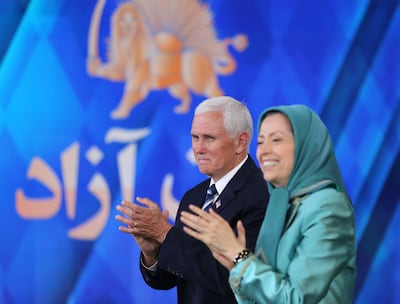The trial of 700 members of the exiled Iranian opposition group The Mojahedin e- Khalq (MEK) will start soon, according to Iran’s General Prosecutor Mohammad Jafar Montazeri, the country’s semi-official Tasnim news agency has reported.
The news comes amid mounting pressure on the left-leaning Islamist group that has long opposed Iranian governments, from the monarchy of Shah Reza Pahlavi to the current theocratic state that gained power in 1979.
Its political wing, the National Council of Resistance of Iran, claims simply to want a democratic Iran.
Critics of the group say it displays the hallmarks of a cult, and it was listed as a terrorist organisation by the US between 1997 and 2012, the year it renounced violence.
Last week Albanian police raided the group’s Ashraf-3 camp near Manze, 20km west of Albania’s capital Tirana, reportedly leaving one man dead and dozens injured, and seizing scores of computers and hard drives.
Authorities said the raid was carried out by the Special Court Against Crime and Corruption due to concerns that the MEK had been involved in terrorist and cyber attacks.
It also cited unsanctioned political activities by the group that went against the 2014 agreement that allowed its members to live in the country, after its former base camp in Iraq had come under attack by Iran-backed militias.
Albania said the group was permitted to stay for humanitarian reasons, but that these did not extend to allowing it to conduct political activities.
The group demanded that the US and UN condemn the attack on the camp, but Washington released a statement to the RFE media outlet, saying it backed Albania's actions.
"We support the government of Albania’s right to investigate any potential illegal activities within its territory," the US State Department said.
The MEK was labelled a terrorist group by the US in 1997, a decision that was reversed after the group publicly renounced violence in 2012, but it has remained highly controversial ever since.
In the US, opinion is divided as to whether to support the organisation or not.
Washington, which previously had senior officials endorse the group – such as former US vice president Mike Pence who visited its headquarters in Tirana last year – quickly distanced itself from the events, saying it was assured the raid was conducted in accordance with the law.

“The US doesn't see MEK as a viable democratic opposition movement that is representative of Iranian people.
“The US State Department continues to have serious concerns about MEK as an organisation, including allegations of abuse committed against its own members," the US said.
On this front, there is now a rare alignment between Washington and Tehran, amid complex ongoing negotiations over Iran's nuclear programme and its holding of dual citizens, including US dual citizens, as hostages.
Iranian Armed Forces Chief of Staff Mohammad Hossein Baqeri warned the country's opposition groups on Wednesday to take lessons from the fate of the MEK.
“The MEK mercenaries have been frustrated and displaced more than ever, in such a way that no European government would shelter them “ he said.
Alex Vatanka, a senior fellow and the founding director of the Iran programme at the Middle East Institute in Washington, told The National that the pressure on the group in France, Albania and Tehran, and the unsympathetic statements on its fate from Washington, could form a part of backchannel US-Iran talks to de-escalate tensions.
"With the cancellation of the MEK rally in France, and now this new pressure from the Albanian government, it will be interpreted – and I think correctly – that some kind of a deal is happening behind the scenes involving the Iranian regime and western governments as part of a presumably soon-to-be-announced new agreement," he said.
"That would include the nuclear issue, prisoner exchange and other compromises each side's going to make.
"MEK will perhaps have its wings clipped. It's an Iranian demand, I assume, and the West appears to be willing to entertain that demand. MEK is under pressure, it's basically a pawn in this tug-of-war between the West and Iran," he says.
From rebel movement to pressure group
Formed in 1965, the leftist revolutionary group was originally opposed to the rule of Mohammad Reza Pahlavi, the last shah of Iran who was overthrown by the 1979 Islamic revolution that created the current regime in Tehran.
It became increasingly radical and throughout the 1970s, resorting to terrorist attacks against government targets, as well as foreign companies – particularly US multinationals – accused of supporting the shah.
After a string of high-profile attacks in the 1970s, Washington blamed the group for killing two US military advisers, a Texaco executive and two employees of Rockwell International, a now defunct aerospace corporation.
It later took part in the 1979 revolution, alongside Shiite Islamist, communist and Kurdish groups.
Like much of the opposition, it quickly became sidelined and reverted to its role as an armed opposition group, before its members fled abroad to countries including France, and Iraq, which waged a bloody war against Iran after the revolution.
During the Iran-Iraq war (1980-1988), the MEK fought on the side of Saddam Hussein against their homeland, launching armed offensives on Iranian soil. At the close of that conflict in 1988, Iran was accused of executing thousands of suspected MEK members.
The Iranian government considers them a terrorist group and claims they are responsible for the deaths of about 17,000 Iranians.
MEK members were based in a camp in Iraq for years, but eventually had to secure an agreement to move to Albania in the mid-2010s after Iraqi officials turned increasingly hostile against them, and their camp came under lethal rocket fire from Iran-backed militias.

